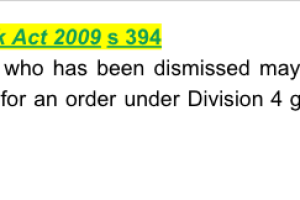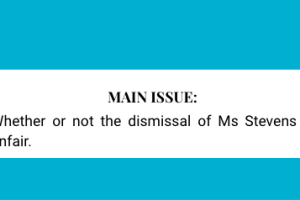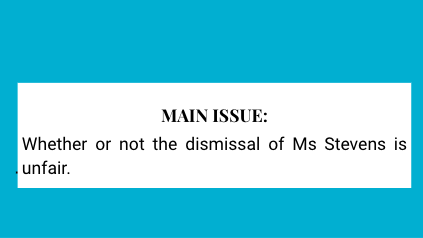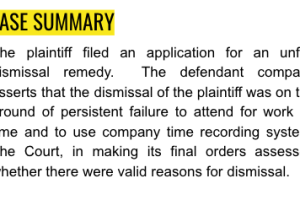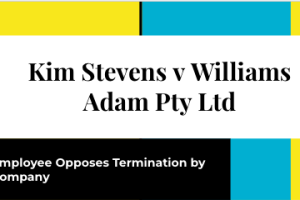Employee Opposes Termination by Company

Kim Stevens v William Adams Pty Ltd [2022] FWC 1851 (18 July 2022)
The plaintiff filed an application for an unfair dismissal remedy. The defendant company asserts that the dismissal of the plaintiff was on the ground of persistent failure to attend work on time and to use the company time recording system. The Court, in making its final orders assessed whether there were valid reasons for dismissal.


Facts:
Ms. Stevens was employed by William Adams Pty Ltd (company) as a used equipment inventory coordinator. She was dismissed on 1 April 2022 for persistently arriving late for work and for failing to use the company’s time recording system. Ms. Stevens contends that the real reason for her dismissal was connected to a sexual harassment complaint she had made in April 2021 concerning a remark made by a co-worker which she believed had suggested that she had an affair with a supplier. She contends that there was no valid reason for her dismissal, that her termination was unfair, and that she should be awarded compensation.
Ms. Simone McKay, the company’s human resources manager, gave evidence that in April 2021 the company advised its workforce that it was introducing a new time and attendance recording system called TANDA.The company wanted to ensure that it was accurately and efficiently recording all hours of work, particularly for award-covered employees who were paid an annualised salary.
Ms. Stevens raised an objection to using TANDA because she was concerned about the system’s ability to collect biometric data. The company then looked into the biometric functionality of TANDA, determined that it was not needed, and disabled it. Ms. Stevens was advised of this decision. She then sent a message to her manager, Mr. Fabio Minuzzo, confirming that she would use the new system.
Ms. McKay said in her evidence that in August 2021, Mr. Minuzzo told her that Ms. Stevens was not arriving for work on time and that she had repeatedly failed to record time correctly on the TANDA system.
On 23 August 2021, Mr. Minuzzo gave Ms. Stevens a letter counselling her about these concerns. But there was no improvement. On 15 October 2021, Mr. Minuzzo gave Ms. Stevens a written warning about the concerns but still, Ms. Stevens continued to arrive for work late.
On 11 November 2021, Mr. Minuzzo issued Ms. Stevens with a final warning which stated that if there was no improvement the company would consider disciplinary action, including dismissal. At a meeting on 25 November 2021, Mr. Minuzzo told Ms. Stevens that if she continued to behave this way she could be dismissed.
At a meeting on 29 March 2022, Ms. McKay and Ms. Arandelovic gave Ms. Stevens a ‘show cause’ letter which stated that the company was now considering terminating her employment because of her continued failure to use the TANDA system and to arrive for work on time. The next day, Ms. Stevens sent a reply to the show cause letter, in which she said, among other things, that she had been the subject of malicious rumours, that it was illogical to terminate her employment, and that she was appalled by Ms. McKay’s request that she provide evidence of her sexual harassment complaint.
At a meeting on 1 April 2022, Ms. McKay told Ms. Stevens that the company had decided to terminate her employment effective immediately because of her consistent failure to arrive for work on time and to comply with time recording obligations. Ms. McKay gave Ms. Stevens a termination letter confirming the reasons for her dismissal. The letter stated that Ms. Stevens would be paid three weeks in lieu of notice.

Issue:
Whether or not the dismissal of Ms. Stevens is unfair.

Applicable law:
Fair Work Act 2009 s 394 - provides that a person who has been dismissed may apply to the FWC for an order under Division 4 granting a remedy.

Analysis:
It is not in dispute that Ms. Stevens was persistently late for work. Ms. Stevens stated in her F2 application that she had been late for work nearly every day for four years. She had been repeatedly warned about both of these things.
Ms. Stevens did not allege that the co-worker made any reference or allusion to her having an affair with any particular person at Vic Low Loaders. The words that caused her offence were ‘You must love Vic Low Loaders’.
The relevant words, spoken in the relevant context, did not carry any sexual or sexualised content or connotation. Ms. Stevens’ dismissal was unconnected to her complaint of April 2021, firstly because Ms. McKay and Ms. Arandelovic were unaware of it.
The company had no knowledge of any other allegations of sexual harassment against Ms. Stevens. Ms. Stevens acknowledged in cross-examination that she did not make any other complaints of sexual harassment to the company, aside from the complaint of April 2021.
Ms. Stevens’ application was made within the 21-day period required by s 394(2) of the Act. Both of the reasons for dismissal cited by the company were valid reasons. First, Ms. Stevens had persistently failed to arrive for work on time. Secondly, she had repeatedly failed to use the TANDA system.
Conclusion:
The company terminated Ms. Stevens’ employment for two clear valid reasons. Ms. Stevens was given a reasonable opportunity to address the company’s concerns about her conduct but she did not do so.
Unbeknown to the company at the time, there was also a third valid reason for her dismissal, namely the fact that she had lied to it about her vaccination status. The dismissal of Ms. Stevens by the company was not harsh, nor was it unjust or unreasonable.

